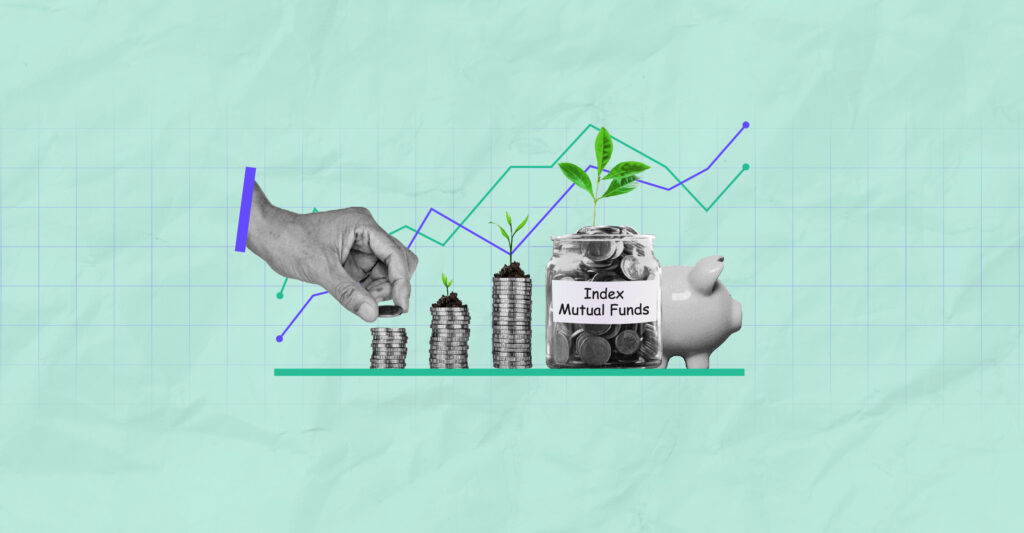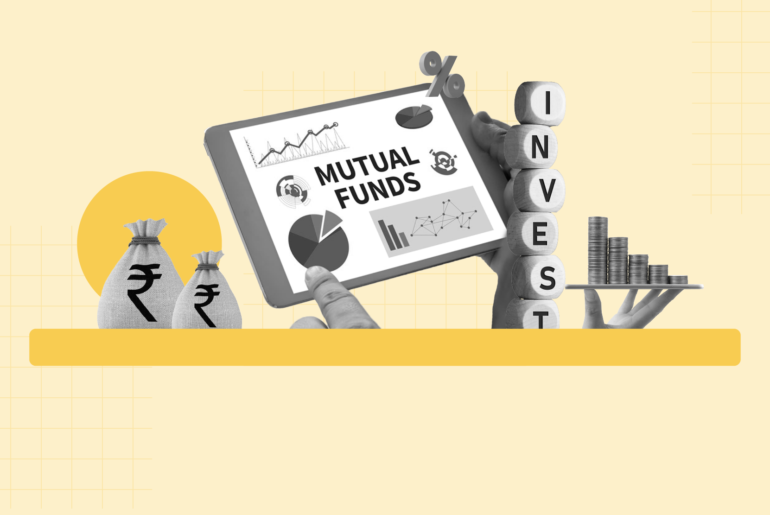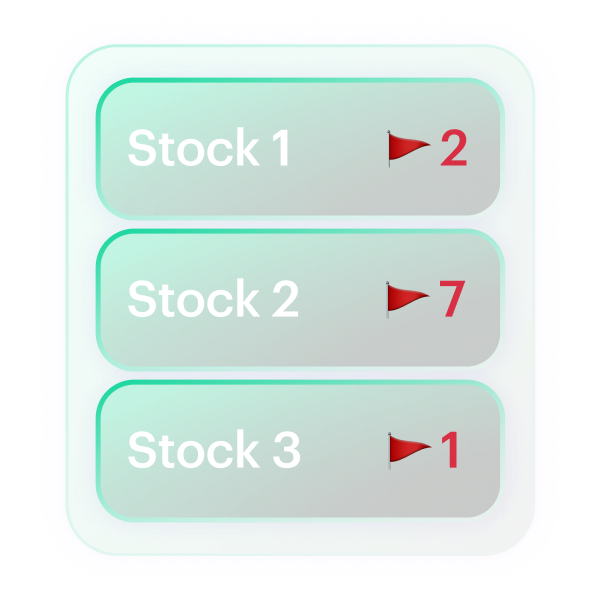Last Updated on Mar 15, 2025 by vanessa sequeira
One of the ways of replicating a benchmark index in your investment portfolio is by investing in index funds. These are mutual funds with a portfolio curated to match or track a stock market index, such as Nifty 50. What are the benefits of such funds, should you invest in them, and what are the best index funds in India in 2023? Let’s find out in this article.
Table of Contents
Best Index Funds in India
| Name | AUM (Rs. in cr.) | CAGR 3Y (%) | Expense Ratio (%) | Tracking Error (%) | CAGR 5Y (%) | CAGR 10Y (%) |
| Nippon India Index Fund-S&P BSE Sensex Plan | 360.97 | 14.83 | 0.15 | 0.06 | 12.88 | 12.47 |
| ICICI Pru S&P BSE Sensex Index Fund | 656.42 | 14.90 | 0.16 | 0.08 | 12.82 | 0 |
| HDFC Index Fund-S&P BSE Sensex | 4214.09 | 14.68 | 0.2 | 0.03 | 12.81 | 12.83 |
| Tata S&P BSE Sensex Index Fund | 176.82 | 14.52 | 0.27 | 0.13 | 12.76 | 12.43 |
| LIC MF S&P BSE Sensex Index Fund | 60.43 | 14.58 | 0.38 | 0.20 | 12.53 | 12.18 |
| IDFC Nifty 50 Index Fund | 574.61 | 15.50 | 0.1 | 0.12 | 12.34 | 12.58 |
| Taurus Nifty 50 Index Fund | 2.03 | 15.62 | 0.44 | 0.73 | 12.25 | 12.32 |
| UTI Nifty 50 Index Fund | 9502.80 | 15.18 | 0.2 | 0.03 | 12.17 | 12.44 |
| Tata NIFTY 50 Index Fund | 338.62 | 15.11 | 0.16 | 0.11 | 12.15 | 12.24 |
| HDFC Index Fund-NIFTY 50 Plan | 7551.40 | 15.06 | 0.2 | 0.04 | 12.11 | 12.51 |
Note: The best index mutual funds in the above table are derived from Tickertape’s Mutual Fund Screener. The data is as of 9th January 2023, and the filters applied are:
- Category: Index Funds
- Plan: Growth
- Tracking Error: Sort from low to high
- Expense ratio
What is an index fund?
An index fund is a type of mutual fund or ETF that invests in securities that are part of a benchmark index. For instance, UTI Nifty 50 Index Fund in India tracks the Nifty 50 index. So, it invests in all the stocks that the index holds in the same proportion.
Whenever the weightage of a stock in the index changes, the fund manager also replicates it in the fund. And if a particular stock is removed or replaced from the index, the fund manager will follow suit.
As such, the performance of the UTI Nifty 50 Index Fund is tied to that of the Nifty 50 index. And since they replicate the index they track, index funds are considered passive investments.
Factors to consider before investing in the best index mutual funds
- Time: Like most passive investments, index funds are also considered best for the long term. Hence, consider the timeline before investing in index funds. It is always worthwhile to seek the advice of a financial advisor.
- Index category: There are many indices belonging to various categories, such as small-cap, mid-cap, large-cap, and more. So pick one in line with your investment objective.
- Risk appetite: The risk depends on the index that the fund is tracking. For instance, if you choose a fund that tracks the Nifty 50 Index, some of the companies get more weightage while others have less. This is not the case with Nifty 50 Equal Weightage funds. And the risks associated with the Nifty 50 index fund and the Nifty 50 Equal Weight index fund are different. So consider your risk appetite and decide the index category based on that.
- Passive investment: As index funds are passive investments, the fund manager has no control over the stocks entering and exiting the fund and how much money is invested in which stock. So know that your fund manager is not entirely responsible for how the investment performs
- Tracking error: It is the difference between the index funds’ returns and the benchmark index. The lower the tracking error, the closer the fund is following the index.
- Expense ratio: It is the annual maintenance expense levied by mutual funds to finance its expenses. The lower the expense ratio, the higher will be your actual returns. Usually, the expense ratio of index funds is lower in comparison with actively managed mutual funds. Hence, keep this factor in check while selecting the index fund for your portfolio.
Advantages of an index fund
- Index funds have a relatively lower expense ratio as they are passively managed
- The stockholdings in an index fund generally belong to well-established companies
Who should invest in index funds?
- Risk-averse investors
- Investors seeking returns similar to an index
- Investors who have a long-term investment horizon
- Investors who don’t want to track their performance continuously
How to invest in index funds?
The process of investing in index funds is the same as in mutual funds:
- Screen index funds using Tickertape’s Mutual Fund Screener
- Analyse your desired fund using Tickertape Index Fund Page
- Invest in them via your mutual fund broker or distributor
Read ‘How to use Tickertape Mutual Fund Screener’ to find a suitable index fund for your portfolio.
How are index funds taxed?
Index funds are taxed as equity funds in India, and understanding the latest tax regulations on equity mutual funds is essential for making informed investment decisions. The Union Budget 2024 has introduced significant changes to the taxation of equity mutual funds, simplifying the tax structure while altering rates and benefits. Here is a detailed breakdown of the new tax rules:
Short-Term Capital Gains (STCG)
If you hold equity mutual funds for less than a year, the gains from these investments are classified as short-term capital gains. According to the new budget, these gains are now taxed at a rate of 20%, which has been increased from the previous rate of 15%.
Long-Term Capital Gains (LTCG)
For equity mutual funds held for more than a year, the gains are considered long-term capital gains. The key points to note under the new budget are:
- Tax-Free Limit: Gains up to Rs. 1.25 lakh in a financial year remain tax-free. This limit has been increased from the previous threshold of Rs. 1 lakh.
- Tax Rate: Any gains above Rs. 1.25 lakh are taxed at a flat rate of 12.5%. It was previously taxed at 10%.
- Indexation: It’s important to note that the benefit of indexation, which previously allowed investors to adjust the purchase price of their assets for inflation, has been removed for all asset classes, including equity mutual funds.
Indexation is a method used to adjust the purchase price of an asset (like property or gold) for inflation over the years. This adjusted price is then used to calculate capital gains. Previously, long-term capital gains from selling property, gold, or other unlisted assets were taxed at 20%, but you could use indexation to reduce your taxable profit. The new rule simplifies the tax structure by setting a flat 12.5% tax rate for all long-term capital gains. However, it removes the indexation benefit.
Summary
| Capital Gains Tax | Holding Period | Old Rate | New Rate |
| Short-Term Capital Gains (STCG) | Less than 12 months | 15% | 20% |
| Long-Term Capital Gains (LTCG) | More than 12 months | 10% | 12.50% |
No Indexation Benefit: This change affects the overall tax liability, potentially increasing it for long-term investors.
Frequently Asked Questions (FAQs)
What is a tracking error in the index mutual funds?
Tracking error is one of the most important measures used to assess the performance of a portfolio. It determines the difference between the return fluctuations of an investment portfolio and the chosen benchmark. The fluctuations are measured by standard deviation.
The lower the tracking error, the closer the manager follows the benchmark. The higher the tracking error, the more the manager deviates from the benchmark.
How many types of index funds are available?
There are eight types of index mutual funds, namely,
-Broad market index funds
-Market capitalisation index funds
-Equal weight index funds
-Factor-based index funds
-Sector-based index funds
-International index funds
-Debt index funds
-Custom index funds
Is an index fund a passive investment?
An index fund doesn’t need active management since it is based on the performance of a market index. Hence, they are known as passive investments. This factor sets them apart from other mutual funds.
How to find the best Nifty 50 index funds?
Log in to Tickertape
Launch Tickertape’s Mutual Fund Screener
Under MF universe, select ‘Funds tracking Nifty’
Add other filters like returns, tracking error, and expense ratio based on your preference
You will get the top index funds in India based on your desired metrics
What is the lock-in period for index funds?
Index funds in India do not have a lock-in period. Investors are free to invest and redeem units at any time.
Do index funds have fees?
Yes. However, the fees associated with index funds is relatively lower as these are passively managed.
What is the difference between an ETF and an index fund?
The major difference between an ETF and an index fund is that the former is traded on stock exchanges and is not a mutual fund, while the latter is a type of mutual funds.
How to find low-cost index funds in India?
-Launch Tickertape’s Mutual Fund
-Select ‘Index Fund’ under Category
-Add ‘expense ratio’ from the filter panel
-Sort the ‘expense ratio’ column from low to high
-You will get the list of index funds that have low to high costs
What is the best index fund in India?
The best index fund depends on your investment objective, risk tolerance, returns expectation, and other factors personal to you. Index funds are of various types depending on the index category they follow. You can use Tickertape’s Mutual Fund Screener to get a list of the best index funds based on your desired parameters.
- Top Large Cap Funds 2025: Discover Blue Chip Performers - Mar 27, 2025
- Gilt Funds in India: Features, Meaning, and Advantages - Mar 13, 2025
- Best Index Funds in India 2025: Top Performing Mutual Funds - Mar 13, 2025




